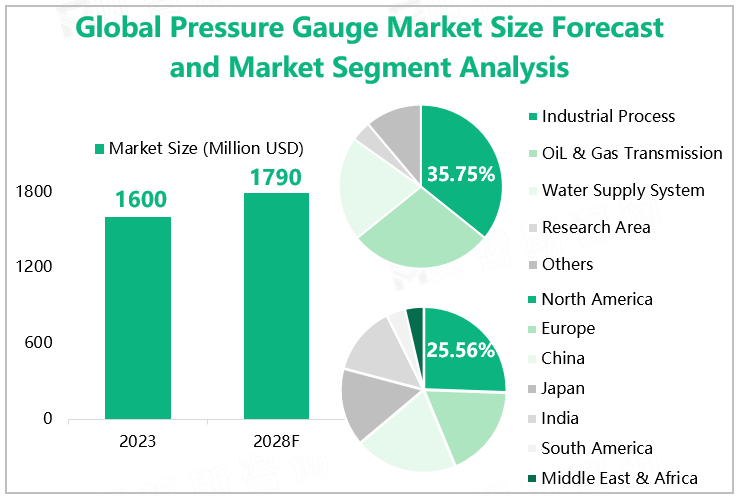A pressure gauge, also known as a pressure gauge,
is an instrument used to measure the pressure of a fluid (usually a gas or
liquid). Its working principle is to provide information about the system state
or operating conditions by sensing fluid pressure and converting it into
readable numerical values.
Introduction to Subdivision Types
|
Classification based on measurement principles
|
-
Elastic pressure gauge: uses the deformation of
elastic components (such as spring tubes, diaphragms, etc.) to measure
pressure.
-
Hydraulic pressure gauge: uses the height of the
liquid column to indicate the magnitude of pressure.
-
Pneumatic pressure gauge: uses the principle of
gas pressure transmission to measure pressure.
-
Electric pressure gauge: uses electrical
principles such as resistance, capacitance, and inductance to measure
pressure.
|
|
Classification based on structure
|
-
Pointer-type pressure gauge: The pressure value
is indicated on the dial by the pointer.
-
Digital pressure gauge: displays the pressure
value through a digital display screen.
-
Remote transmission pressure gauge: It can
remotely transmit pressure signals to other equipment or systems for analysis
and processing.
|
|
Classification based on usage environment
|
-
Ordinary pressure gauge: suitable for general
industrial environments.
-
Seismic pressure gauge: suitable for environments
with high vibrations.
-
Explosion-proof pressure gauge: suitable for
flammable and explosive environments.
-
High-temperature pressure gauge: suitable for
high-temperature environments.
-
Low-temperature pressure gauge: suitable for low-temperature
environments.
|
Source: www.globalmarketmonitor.com
Overview of Market Development and Analysis of Segmented Markets
In recent years, with the recovery of the global economy and industrial upgrading, the demand for pressure gauges has maintained a stable growth trend. Especially in emerging markets and developing countries, with the advancement of infrastructure construction and industrialization, the demand for pressure gauges in the market continues to increase. According to our research data, the global pressure gauge market size reached $1600 million in 2023, an increase of 2.22% compared to 2022.
From downstream applications, the application of pressure gauges involves many fields such as industrial processes, oil and gas transmission, water supply, energy, and environmental protection. Among them, the industrial process sector is the largest downstream application market, with an application share of 35.75% in 2023. In addition, there is a particularly urgent demand for high-precision and high-stability pressure gauges in fields such as petrochemicals, energy, and environmental protection.
From a regional distribution perspective, the global pressure gauge market is mainly concentrated in North America, Europe, and the Asia Pacific region. Among them, the Asia Pacific region is the largest revenue market, with a global market share of over 55%. In the Asia Pacific region, China, Japan, and India are also important components of the global pressure gauge market, occupying a significant market share.
Global Pressure Gauge Market Size Forecast and Market Segment Analysis
Source: www.globalmarketmonitor.com
Market Outlook Forecast
In the future, with the continuous emergence of new materials, processes, and technologies, the performance of pressure gauges will be further improved. Intelligent and digital technologies will be more widely applied in the manufacturing and use of pressure gauges, improving the added value and market competitiveness of products. This will promote further market expansion. It is expected that the global pressure gauge market will increase to $1790 million by 2028.
